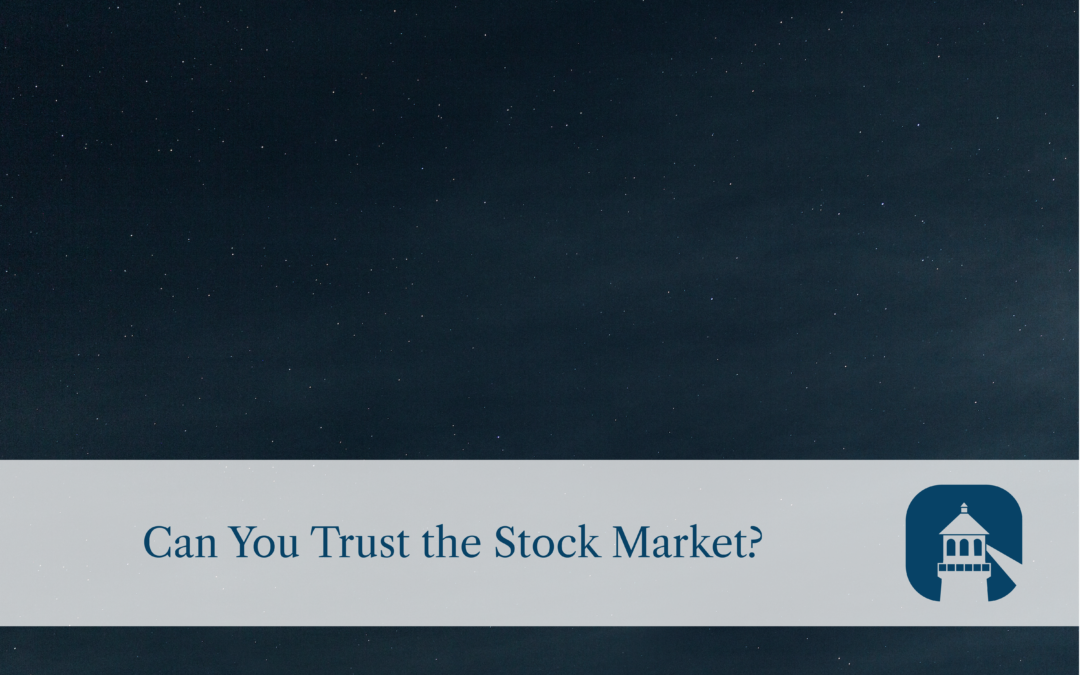It feels like we’ve been saying this for years at this point, but it’s still true: The stock market is unpredictable. It’s sometimes up when it “should” be down or vice versa, and it seems like any little thing can set off a big swing in one direction or the other. It’s no surprise that many people are wondering whether it’s still a good idea to invest in stocks.
If you’re wondering whether you can trust the stock market, you’re not alone. We’ve seen the market take so many wild turns over the last couple of years. Some investors have profited significantly off meme stocks while others with more traditional portfolios have watched their stock values fall.
Does that mean stocks shouldn’t be part of a retirement plan? Is there a better, more reliable way to invest in the stock market? Like every investment, there isn’t a single right answer that’s the same for everyone. The key is to balance the risks and rewards of all your investments and make sure they align with your short- and long-term financial goals.
Context Is Everything
If you’re worrying about instability in the market or seeing the value of your portfolio drop, it’s easy to start panicking. But before you make a drastic change to your investment strategy, take a minute to look at the big picture.
The stock market changes quickly, and even big rises or falls often have minimal impact on the long-term value of investments. Additionally, a change in the market doesn’t always impact every stock equally, so the effect on your portfolio might not be the same as someone else’s.
Investment Strategy Matters
In many cases, the stock market stories that make the news (for better or worse) are about the rise or fall of a single stock. For example, when something happens with one of the biggest companies on the market, it’s bound to make news. But most experts recommend a diversified investment strategy that isn’t solely dependent on the “big-name” stocks.
If you have a diversified portfolio, you don’t have to worry as much about Microsoft’s price skyrocketing or Apple’s plunging. Chances are the opposite will happen next week or month. But if you are invested in a wide range of stocks and other assets, any single change has less of an impact on your portfolio.
Taking Care of the Basics First
For most people, the stock market is a long-term investment tool, not a means to make short-term income. Chances are you’re not relying on the value of your portfolio for your immediate financial needs. And if you are, that might be something you want to change.
Stocks should be just one piece of your overall financial picture. Financial planning is all about building a comprehensive strategy that includes contingencies. And it’s also about making plans to address unexpected challenges.
For example, that’s why it’s important to have a savings account or emergency fund. If you suddenly need to pay for a hospital visit or replace a broken water heater, you probably wouldn’t want to pull that money from your investment portfolio, no matter what the market is doing. When you aren’t relying on stock values to pay your bills, it’s easier to have a more accurate perspective on the market.
Managing Risk
Investing in the stock market always comes down to managing risk. And it’s a balance – low-risk investments (such as bonds) are generally low-reward as well, whereas many high-risk options offer the potential for high rewards. Diversification usually means investing in a range of different opportunities so you can balance the potential rewards with the risks.

Managing risk isn’t really about determining whether the stock market is “trustworthy.” It will act as it always has — it will rise and fall depending on what’s going on in the world. But historically, the market goes up over time, which is why it’s often considered a relatively safe option for long-term investments.
Changing Your Perception
Sometimes, it feels like the stock market just isn’t worth it, especially during times when things are unpredictable and often negative. It’s normal to wonder if you should really trust the market with your money, or if it’s better to just choose a different route altogether.
But it’s crucial to remember that investing in stocks doesn’t mean you’re just making bets on global politics or the cultural popularity of one company over another. You’re betting on people and their ability to innovate. You’re trusting that the humans in those companies are going to adapt, invent, and find ways to overcome challenges. And those are some of the things that people do best, which is why we’ve always seen the market bounce back from drops and down periods.
The stock market is complicated, and investments shouldn’t be taken lightly. That’s why it’s so important to educate yourself as much as possible and to focus on making decisions that align with your unique financial goals.
If you aren’t sure how to do that, we are here to help. The Guiding Wealth team is full of experienced financial planners who have helped numerous clients build balanced, diversified portfolios. Whether you’re just starting to invest toward retirement or you have a complex portfolio you’d like an expert to manage, we can help. Schedule a consultation to get started.



